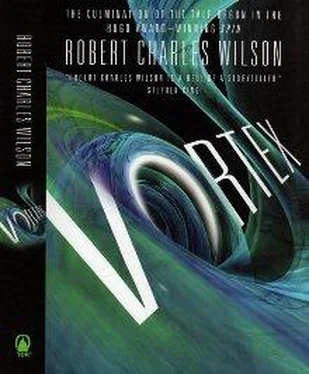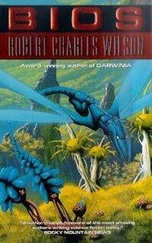“But she couldn’t do it. She didn’t have the painting anymore. At first she had hung it on the wall above the headboard of her bed, but at some point it had begun to embarrass her—it seemed crude and sentimental, and she didn’t want her friends to see it, so she put it in her closet, out of sight. If her father noticed, he never said a word. Then one day when she was cleaning out her old stuff—her baby things, dolls and toys she was never going to touch again—she put the painting in a box along with everything else and carried it down to the Goodwill store as a donation.
“But she couldn’t bring herself to admit that, not when her father was gaunt and yellow and breathing with the help of an oxygen tank. So she nodded and said she’d bring the painting next time she came to the hospital.
“Back home, she went through her closet as if she expected to find the painting still there, knowing all the time it was gone. She even went to the thrift shop and asked about it, but the painting must have been sold or recycled long since. So when she came to the hospital the next day her father was disappointed, and she made some excuse and promised she’d remember to bring it tomorrow, a lie that only compounded her shame. And she came back to the hospital room every day, day after day, and every day he was weaker and more frightened, and every day he asked about the painting, and every day she promised she’d bring it to him. Of course he died without seeing it.”
There was no sound but the groaning of the ship’s hull. Fragments of the Arch were coming in more often now, their radar tracks rolling across the display like bright blue raindrops. Turk was quiet for a long time. Finally he said, “That’s Allison’s grief—the original Allison. She lived and died with it. You don’t need to carry it for her.”
“No more than you need to carry the burden of that old killing.”
“You don’t see any difference?”
He was still avoiding the truth and he had missed the point of my story. So I tried to lead him to it more bluntly:
“Think about that temporal Arch, back in the Equatorian desert. It’s not like the Arches that connect the worlds—the temporal Arches were never meant for human beings. They’re a device the Hypotheticals use to preserve information over time. Preserve it by duplicating it. The Hypotheticals took you and they remembered you and eventually they re-created you, and that means the real Turk Findley is as dead and long-gone as the real Allison Pearl. You’re a convincing replica, but you were born in a desert with another man’s memories—you’re no more responsible for that man’s sins than I am for Allison’s.”
Turk stared at me. For a moment he looked violently angry. And for a moment I was afraid of him.
Then he stood and walked into the aft section of the aircraft, down among the shadows, leaving me alone with the roaring of the storm.
* * *
Debris impacts began to diminish over the following days, and after a week the ship’s radar registered nothing above the atmosphere but a scattering of dust and fragments. All that remained of the Arch on Earth were two fractured stumps projecting from the Indian Ocean, the tallest rising five thousand feet above sea level. The Earth was entirely isolated now—as alone in the universe as it had been in the long millennia before the Spin.
Turk and I didn’t talk about what we had said to each other that difficult night. Instead we took solace from simple words and simple warmth. We may have been false and inauthentic things, but at least we understood each other. Each of us made a presence for the other’s vacancy. We tried to pretend time wasn’t passing.
But it was. The ship’s stores began to run low. And when it was impossible to delay any longer, Turk unmoored us from our rocky island and took us up above the highest clouds, up where we could see the stars.
I didn’t want to stop there. I wanted to go where our airship couldn’t take us. I wanted to range out among those distant suns and worlds. I wanted to take giant steps from star to star, the way the Hypotheticals did.
Of course I couldn’t. We couldn’t even go home. We had no home. All we had was Vox, if there was still a Vox. So we flew south, dawn to starboard and the ruins of history behind us and nothing ahead but strangeness and faint hope.
Chapter Twenty-nine
Sandra and Bose
The minutes tracked past like boxcars in an endless train as Sandra sat at the restaurant window, waiting for Bose. Fifteen minutes. Then thirty. Then forty. We’re doing this insane thing, she thought, and now it’s going wrong. Outside, the storm eased and then gathered strength again. It was the price paid for all those weeks of remorseless dry heat, a terrible karmic balance being struck.
Across the street, a bus pulled up. It idled briefly, then cleared its throat and ambled off into the sheeting dark. At first Sandra thought no one had gotten off. Then she saw the figure standing outside the halo of the streetlight, dressed stupidly for the weather: a yellow short-sleeved shirt that stuck to his skin like a coat of paint. A skinny kid, all ribs. It was Orrin, of course.
She stood up without thinking and ran from the restaurant, the counter clerk calling after her in alarm: Ma’am? Ma’am?
“Dr. Cole,” Orrin said when she reached him. He didn’t seem surprised to see her. His expression was mournful. “I got lost,” he confessed. “I should have been here before now. I guess you know I mean to stop Turk Findley from doing what he means to do.” His lip trembled. “But I think I’m too late.”
“No, Orrin, listen, it’s all right.” The rain had gone through her clothes as if they didn’t exist, and she hugged herself to keep from shivering. “I understand. Turk got here a little while ago, but Officer Bose went after him.”
Orrin blinked. “Officer Bose is with him?”
“Officer Bose won’t let him set that fire.”
“You mean that?”
“It’s the absolute truth. He ought to be back any minute.”
Orrin’s shoulders slumped with relief. “I thank you for coming here,” he said, his voice barely audible over the hammering of the rain. “I really do. I suppose you read what I wrote in my notebooks?”
Sandra nodded.
“It’s not happening the way it did. But I guess that’s to be expected.”
“How do you mean?”
“It’s not just one thing,” he said solemnly. “It’s the sum of all paths.”
Sandra wanted to ask what he was talking about, but not while they were standing exposed at the bus stop. “Come across the street with me, Orrin. We’ll wait for Bose over there. He won’t be long.”
“I would like a cup of coffee,” Orrin said.
Sandra turned, but drew back before she could step off the curb. A car pulled up, blocking her path. The passenger-side window rolled down and Sandra could see two men inside. The passenger was a middle-aged man, smiling tightly. The driver had a gun held loosely across his thigh.
“Hello, Dr. Cole,” the passenger said. “Hello, Orrin.”
Sandra recognized the voice. She felt numb. She wanted to run but she couldn’t take her eyes from the car. She felt rooted in place.
“Hello, Mr. Findley,” Orrin said sadly.
“I’m sorry to see you here, Orrin. That’s not good news for either of us. Why don’t you and Dr. Cole get in back, so we can talk.”
* * *
The driver kept his engine idling but didn’t drive away. Sandra prayed he wouldn’t. As long as she was within sight of this ugly road, the bus stop, the coffee shop across the street with its yellow lighted windows, it was possible to believe she might still get away unhurt. But if the car began to move it would carry her out of the familiar world, into that unlit land where unspeakable things happen.
Читать дальше












